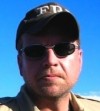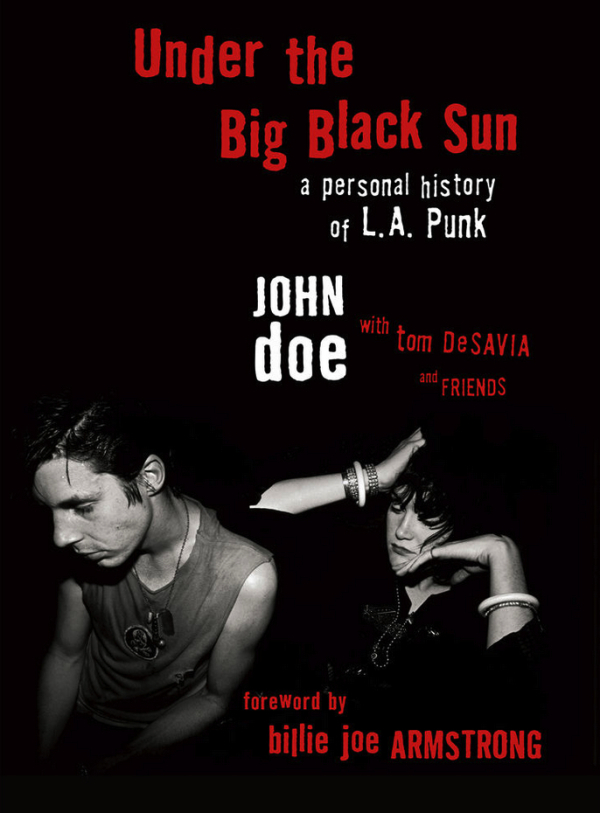 BY JONATHAN VALANIA FOR VICE “The west is the best,” Jim Morrison sang in 1967. “Get here, and we’ll do the rest.” In 1976, John Doe took Mr. Mojo Risin’ up on the invitation. Fed up with the bleak fatalism, shitty weather and general played-out-ness of the East Coast scene, Doe loaded up the truck and headed to the City Of Angels, where he would soon meet fellow East Coast exile/aspiring punk poet Exene Cervenka. Together they would form the legendary X — arguably one of the few bands that could convincingly stake a claim to The Clash’s status as The Only Band That Matters — and light the fuse of the impending West Coast punk explosion. The rest is history, all of which is detailed in Under The Big Black Sun: A Personal History Of L.A. Punk, Doe’s recently-published memoir, co-authored with SoCal punk luminaries like Mike Watt of The Minutemen, Henry Rollins of Black Flag, Dave Alvin of The Blasters, Jack Grisham of TSOL, Charlotte Caffey of The Go Go’s and Exene, to name but a few. Recently, we got Doe on the horn to discuss the history of West Coast punk as well as his swell new album, The Westerner.
BY JONATHAN VALANIA FOR VICE “The west is the best,” Jim Morrison sang in 1967. “Get here, and we’ll do the rest.” In 1976, John Doe took Mr. Mojo Risin’ up on the invitation. Fed up with the bleak fatalism, shitty weather and general played-out-ness of the East Coast scene, Doe loaded up the truck and headed to the City Of Angels, where he would soon meet fellow East Coast exile/aspiring punk poet Exene Cervenka. Together they would form the legendary X — arguably one of the few bands that could convincingly stake a claim to The Clash’s status as The Only Band That Matters — and light the fuse of the impending West Coast punk explosion. The rest is history, all of which is detailed in Under The Big Black Sun: A Personal History Of L.A. Punk, Doe’s recently-published memoir, co-authored with SoCal punk luminaries like Mike Watt of The Minutemen, Henry Rollins of Black Flag, Dave Alvin of The Blasters, Jack Grisham of TSOL, Charlotte Caffey of The Go Go’s and Exene, to name but a few. Recently, we got Doe on the horn to discuss the history of West Coast punk as well as his swell new album, The Westerner.
VICE: The world knows you as John Doe but you were born John Nomenson Duchac, am I pronouncing that right?
JOHN DOE: You mispronounced just like everyone else does.
VICE: Please school me.
JOHN DOE: No reason to. I could have said that my real name was Adolf Hitler but I didn’t think it would go over so well, or that my name was Samuel Clemens. It doesn’t matter. It’s much more fun to be John Doe than anyone else.
VICE: You were born in Decatur, Illinois and came of age in Baltimore. What was the final straw, like ‘That’s it, I’m outta here, I’m going to Los Angeles…’
JOHN DOE: I moved to LA because I was sick of the East Coast. There are a lot of ghosts on the East Coast and there is a lot of sleet and shitty weather. Baltimore, as you know, only has one truly famous person which is John Waters. I had been to CBGB’s, I’d been to Max’s Kansas City. I’d seen the Talking Heads and The Heartbreakers and realized that that music scene was already pretty locked up by 1976. I went to LA with a friend and it was glorious. I was a huge fan of the writers that came out of LA — of Nathaniel West and Charles Bukowski and people like that. There is a freedom on the West Coast that is not available to people who grow up on the East Coast.
VICE: It was sort of like, ‘Let’s go out to LA and invent punk, it hasn’t hit there yet’?
JOHN DOE: It was just getting started, you know, everywhere. It was in the air, that’s why it took hold so fast in England. The Ramones went there in what, ’74, then POW! everything happened. There were people who were also musical outcasts living in LA at the time. We got here right as it was starting.
VICE: In the book there’s a great chapter where you talk about LA in the ‘70s, how cheap and livable it was, how little gridlock there was, how you could buy these cool vintage cars from the ‘50s and ‘60s for $500 bucks and [X guitarist] Billy Zoom would help you fix it up. You could always be in the desert or the Pacific Ocean in less than an hour. How did that kind of mobility impact the West Coast punk scene?
JOHN DOE: Yeah. I think it included the [predominantly Latino] East Side that allowed everybody to break out and have a certain speed and freedom to do the same. Made me feel more connected to my rock n’ roll heroes, Chuck Berry and Eddie Cochran and people like that.
VICE: Because they were always celebrating the freedom of the open road?
JOHN DOE: Yes. It was always meant to be about freedom, and there’s nothing more liberating than being in a car. I mean, you’re deciding where and when you’re going to be some place. That’s why people get so pissed off in cars. Because somebody else is interrupting their space and time. Get out of my fucking way! I’m supposed to be there!
VICE: What were you driving back then?
JOHN DOE: I had a 56 Ford Customline. It was just a four door Ford and also, before that was an International Travelall, I think it was a ‘70 or ‘71. That was our first touring vehicle.
VICE: What was the first time you met [X’s singer/songwriter] Exene?
JOHN DOE: Well, I ran a poetry reading series in Baltimore. There was a fairly popular and vital poetry world in Baltimore and D.C. at that time, when poetry became a performance medium rather than just on the written page. People were writing funny stuff and there was a gay and lesbian element that was included in that. I figured the best way to meet people in LA was to be in the poetry world. Exene had just gotten a job through a government program to work at a small press called Beyond Baroque. Beyond Baroque had a writing workshop, like a poetry workshop, I think it was Tuesday nights and we met there.
VICE: Was it love at first sight?
VICE: Oh, you know, she cut a very eccentric figure back then, and she does now. I don’t know if it was love at first sight, definitely wasn’t for her. I mean, it took me a good eight or nine months of hanging around and being annoying for her to really…I don’t know, we were friends first. Then we were romantically involved. I realized that we had some kind of soul mate connection and we will have that as long as we live.
VICE: Speaking of poetry, I’m not sure there is a better distillation of punk’s ethos than “We’re desperate, get used to it.” Except maybe “The world’s a mess, it’s in my kiss.” Tell me a little bit how you guys would write songs. Was a lot of this stuff poetry first, then it became songs? Lyrics written to go with tunes? A little bit of both?
JOHN DOE: Yes…is the short answer. A lot of Exene’s lyrics were written as songs and were kind of written, like “The World’s A Mess” was written top to bottom as a song. There was very little editing necessary. I would write the music and kind of mix and match them. They were all directly from our life experience. We just exaggerated stuff. The first time we rehearsed it was clear, like “Oh this is a really great song, this is going to last.” And then the world was kind enough to be fucked up over and over again and made it last because it’s never going to be untrue.
VICE: How did you guys get hooked up with [Doors keyboardist/ X producer] Ray Manzarek?
JOHN DOE: He saw us at The Whiskey A Go Go. He and his wife Dorothy were at the Whiskey and we were playing the song “Soul Kitchen” by The Doors at a much faster pace and Dorothy said “Oh Ray, they are playing your song!” and Ray said “What? They are doing what? Oh, oh wow, they are playing…!” There was a long article in LA Weekly that talked about the band and the lyrics and they quoted “Johnny Hit And Run Pauline” and he really identified with the dark nature of that because it was similar to what Jim Morrison might write. He talked to us and we were flabbergasted that a real rock icon wanted to work with a scruffy punk rock band.
VICE: There were definite parallels between X and The Doors. Both bands were literary, transgressive, noir-ish and based in LA. What did you guys make of those comparisons? Did it irk you or were you flattered by that?
JOHN DOE: We were huge Doors fans. They were real rock royalty, if you want to call that. They had number one hits and they did it on their own terms. Their music sounds the same now as it did then. Whereas some of Jimi Hendrix stuff sounds dated because it was so based in blues music and American blues. We were incredibly flattered that people saw a connection. I think because we felt some of the same themes that Raymond Chandler or some great film noir movies addressed: In LA it’s all the more obvious to the have-nots how much money is being wasted by the haves. That was sort of where we were coming from in 1977. MORE
JOHN DOE + STEVEN MAGLIO @ THE BOOT & SADDLE MONDAY DEC. 11TH

